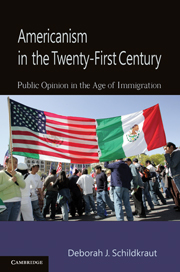Book contents
- Frontmatter
- Contents
- Figures and Tables
- Acknowledgments
- 1 Introduction: American Identity in the Twenty-First Century
- 2 The Twenty-First-Century Americanism Survey
- 3 Defining American Identity in the Twenty-First Century
- 4 Policy Implications of Multidimensional Americanism
- 5 The Myths and Realities of Identity Prioritization
- 6 Does “Becoming American” Create a “Better” American?
- 7 Immigrant Resentment: When the Work Ethic Backfires
- 8 The Politics of American Identity
- Appendix A 21-CAS Survey Questions
- Appendix B Supplementary Tables from Chapter 3
- Appendix C Supplementary Tables from Chapter 5
- Appendix D Supplementary Tables from Chapter 6
- Appendix E Supplementary Tables from Chapter 7
- References
- Index
3 - Defining American Identity in the Twenty-First Century
Published online by Cambridge University Press: 05 June 2012
- Frontmatter
- Contents
- Figures and Tables
- Acknowledgments
- 1 Introduction: American Identity in the Twenty-First Century
- 2 The Twenty-First-Century Americanism Survey
- 3 Defining American Identity in the Twenty-First Century
- 4 Policy Implications of Multidimensional Americanism
- 5 The Myths and Realities of Identity Prioritization
- 6 Does “Becoming American” Create a “Better” American?
- 7 Immigrant Resentment: When the Work Ethic Backfires
- 8 The Politics of American Identity
- Appendix A 21-CAS Survey Questions
- Appendix B Supplementary Tables from Chapter 3
- Appendix C Supplementary Tables from Chapter 5
- Appendix D Supplementary Tables from Chapter 6
- Appendix E Supplementary Tables from Chapter 7
- References
- Index
Summary
As streets in cities across America filled with activists rallying to support immigrants in the spring of 2006, renewed attention was drawn to the question of whether the rapidly changing ethnic demography of the United States is changing what being American means. A central concern is one raised by the late Samuel Huntington – that a multicultural America will become a multicreedal America (2004). Conservative icon Phyllis Schlafly, for example, warns that many immigrants today threaten our cultural norms, including our economic norms and the rule of law (2006; also see Bauer 2006; Farmer 2006; Wilson 2006). Even commentators who explicitly link their concerns to national ancestry justify their position by arguing that immigrants reject the norms and values that define being American (Buchanan 2006). It is not just those on the right who voice such concerns. An avowed “lifelong Democrat” and “early and avid supporter of Obama” recently wrote in the Christian Science Monitor that “heavy immigration from Latin America threatens our cohesiveness as a nation,” and that “Latinos are not melting into our cultural mainstream” (Harrison 2009). He goes on to warn that the instability of democracy in Latin America is being imported to the United States and argues that no equivalent in Spanish exists for the words compromise or accountability. The message from such warnings is clear: today's immigrants and their children do not adopt American civic norms and therefore threaten our democratic stability.
The fear that the presence of groups of people with varying sets of cultural and civic norms undermines stability is not confined to the pundits. Scholars of social psychology and democratic theory have long examined the dynamics of group relations and the conditions under which conflict is more or less likely to emerge. Research in both of these fields suggests that the perception of a common group identity and a shared understanding of a group's value and meaning can be important ingredients for stability and cooperation.
- Type
- Chapter
- Information
- Americanism in the Twenty-First CenturyPublic Opinion in the Age of Immigration, pp. 34 - 62Publisher: Cambridge University PressPrint publication year: 2010

